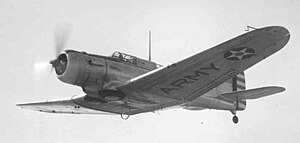Douglas A-33
| A-33/Model 8A-5 | |
|---|---|

| |
| Northrop A-17/Douglas A-33 | |
| Role | Attack aircraft |
| National origin | United States |
| Manufacturer | Douglas Aircraft Company |
| Introduction | 1941 |
| Primary user | United States Army Air Corps |
| Number built | 36 |
| Developed from | Northrop A-17 |
The Douglas A-33 (Model 8A-5) was an American attack aircraft built in small numbers during World War II. It was an updated version of the Northrop A-17, with a more powerful engine and an increased bomb load. While the A-33 was intended initially for the export market, the entire production run was taken up by the United States Army Air Corps.
Design and development[edit]
In 1932, the Northrop Corporation had been formed as a partly owned subsidiary of Douglas and by 1937, the Northrop Model 8 became known as the Douglas 8A produced in the El Segundo Division of Douglas aircraft.
The 8A-5 was powered by a 1,200 hp (895 kW) Wright R-1820-87 engine and was the most powerful and best armed of the series, with four wing mounted 0.30 in machine guns, two 0.50 in machine guns in pods below the wing, a rear-firing flexibly mounted 0.30 in gun, and the ability carry up to 2,000 lb of bombs.
Operational history[edit]
Early in 1940, the Norwegian government ordered 36 8A-5s which not had been delivered before Norway was invaded by the Germans. Completed between October 1940 and January 1941, the aircraft were delivered to a training center in Canada that had been set up for the Norwegian government-in-exile, named "Little Norway" at Toronto Island Airport, Ontario.
After the loss of two aircraft and a reassessment of the training needs now met by the use of other aircraft, the remaining 34 Model 8A-5Ps were sold to Peru. However, 31 were repossessed by the Army Air Corps at the start of World War II. These aircraft, designated A-33, were used for training, target tug, and utility duties.[1]
Variants[edit]
- Model 8A-5
- A-33
- Serial numbers: 42-13584/13601; 42-109007/109019
Operators[edit]
Specifications (A-33)[edit]
Data from McDonnell Douglas Aircraft since 1920[2]
General characteristics
- Crew: 2
- Length: 32 ft 6 in (9.91 m)
- Wingspan: 47 ft 9 in (14.55 m)
- Height: 9 ft 4 in (2.84 m)
- Wing area: 363 sq ft (33.7 m2)
- Airfoil: root: NACA 2215; tip: NACA 2209[3]
- Empty weight: 5,510 lb (2,499 kg)
- Gross weight: 8,600 lb (3,901 kg)
- Max takeoff weight: 9,200 lb (4,173 kg)
- Powerplant: 1 × Wright GR-1820-G205A Cyclone 9-cylinder air-cooled radial piston engine, 1,200 hp (890 kW)
- Propellers: 3-bladed variable-pitch propeller
Performance
- Maximum speed: 248 mph (399 km/h, 216 kn) at 15,700 ft (4,800 m)
- Service ceiling: 29,000 ft (8,800 m)
- Time to altitude: 10,000 ft (3,000 m) in 5 minutes 48 seconds
Armament
- Guns:
- 4 × forward-firing .30 cal (7.62mm) 1919 Browning machine guns, 500rpg
- 2 × forward-firing .50 cal M2 Brownings in gun pods, 200rpg
- 1 × .30 cal (7.62mm) 1919 Browning machine gun in rear cockpit, 1,000 rounds
- Bombs: 2,000lb max load
- Internal: Up to twenty 20 lb (9.1 kg) bombs in internal racks
- External: Eight hardpoints under the fuselage, four outboard hardpoints can take 500 lb (230 kg) bombs, all eight can carry 100 lb (45 kg)
See also[edit]
Related development
Aircraft of comparable role, configuration, and era
- Curtiss SB2C Helldiver
- Douglas SBD Dauntless
- Fairey Barracuda
- Fairey Fulmar
- Ilyushin Il-2
- Junkers Ju 187
- Sukhoi Su-6
- Mitsubishi Ki-51
- Vultee Vengeance
- Yokosuka D4Y
References[edit]
- Notes
- ^ Pelletier Air Enthusiast September/October 1998, pp. 3–4.
- ^ Francillon 1979, p. 222.
- ^ Lednicer, David. "The Incomplete Guide to Airfoil Usage". m-selig.ae.illinois.edu. Retrieved 16 April 2019.
- Bibliography
- Francillon, René J. McDonnell Douglas Aircraft since 1920. London: Putnam, 1979. ISBN 0-370-00050-1.
- Pelletier, Alain J. "Northrop's Connection: The unsung A-17 attack aircraft and its legacy, Part 1". Air Enthusiast No 75, May–June 1998, pp. 62–67. Stamford, Lincolnshire: Key Publishing. ISSN 0143-5450.
- Pelletier, Alain J. "Northrop's Connection: The unsung A-17 attack aircraft and its legacy, Part 2". Air Enthusiast No 77, September–October 1998, pp. 2–15. Stamford, Lincolnshire: Key Publishing. ISSN 0143-5450.
- Wagner, Ray. American Combat Planes of the 20th Century, Third Enlarged Edition. New York: Doubleday, 1982. ISBN 978-0-930083-17-5.
- Andrade, John M. . U.S Military Aircraft Designations and Serials since 1909. Leicester: Midland Counties Publications, 1979. ISBN 0-904597-22-9.
- Swanborough, F. G. and Peter M. Bowers. United States Military aircraft since 1909. London: Putnam, 1963, 1971, 1989. ISBN 0-85177-816-X.
Further reading[edit]
- Instructions for the Erection and Maintenance of the Douglas Model 8A-5 Airplane. El Segundo, California: El Segundo Division, Douglas Aircraft Company. 16 September 1940. Retrieved 12 March 2021.
